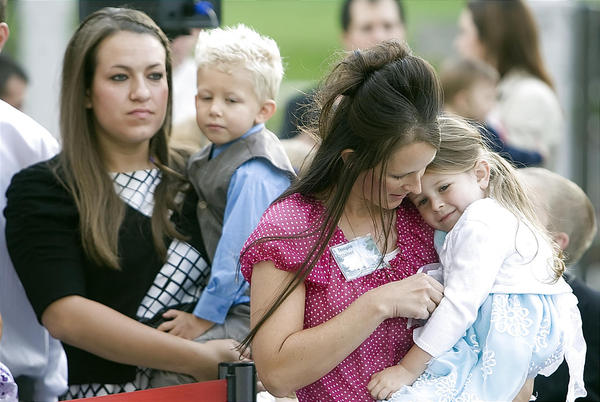Utah’s percentage of babies who are born to unwed mothers ranks lowest in the nation—just 14.7 percent, according to recent census estimates. In 2011, 35.7 percent of U.S. babies were born to unwed moms—continuing a trend that began in the 1940s. But as for Utah, “situation normal,” said Pam Perlich, a University of Utah research economist. “The biggest driver here is Mormon culture, for sure.” [1]
 President Gordon B. Hinckley, the late president of The Church of Jesus Christ of Latter-day Saints, sometimes inadvertently called the Mormon Church, said:
President Gordon B. Hinckley, the late president of The Church of Jesus Christ of Latter-day Saints, sometimes inadvertently called the Mormon Church, said:
We believe in chastity before marriage and total fidelity after marriage. That sums it up. That is the way to happiness in living. That is the way to satisfaction. It brings peace to the heart and peace to the home. [2]
However, Perlich said:
We do know there is a generational change in how people are viewing families and living arrangements and marriage. That’s happening in Utah, too, but the big difference here is the Mormon culture region and the high value placed on marriage and family— family being strictly defined [here] as between a man and a woman with kids. We know that people live in a wide, wide diversity of households besides that. But in the Mormon culture region, those other more diverse households are a smaller portion of the population. [1]
Of the number of babies born to unwed mothers, Utah’s five metropolitan areas are essentially in a statistical tie, according to Census Bureau estimates, because of sampling margins of error in surveys. “The estimated birth rates were: Provo-Orem, 8.2 percent; St. George, 10.4; Logan, 10.7; Ogden-Clearfield, 14; and Salt Lake City, 17.9.” [1]
Children Born Out of Wedlock are, Statistically, at a Disadvantage
The census report said recent social science studies show that “births outside of marriage are often associated with disadvantage for both children and their parents.” [1]
The report also said:
Women and men who have children outside of marriage are younger on average, have less education, and have lower income than married parents. … Children who are born to unmarried parents are more likely to live in poverty and to have poor developmental outcomes. … The poorer developmental and behavioral outcomes experienced by children living in cohabitating households may be due in part to family instability. [1]
It is no surprise, perhaps, that the most active members of The Church of Jesus Christ of Latter-day Saints are also the best educated (Pew Forum Survey), opposite most religions worldwide.
In 2012, Elder M. Russell Ballard, a member of the Quorum of the Twelve Apostles (a governing body of The Church of Jesus Christ, said:
It is our homes and families that need reforming in this increasingly materialistic and secular world. A stunning example is the growing disregard for marriage here in the United States. Earlier this year the New York Times reported that ‘the share of children born to unmarried women has crossed a threshold: more than half of births to American women under 30 occur outside marriage’ (Jason DeParle and Sabrina Tavernise, ‘Unwed Mothers Now a Majority Before Age of 30,’ New York Times, Feb. 18, 2012, A1)….
Equally worrisome is the ever-growing gap between the rich and poor and between those who strive to preserve family values and commitments and those who have given up on doing so. Statistically, those who have less education and consequently lower incomes are less likely to marry and to go to church and much more likely to be involved in crime and to have children outside of marriage. And these trends are also troubling in much of the rest of the world. (See W. Bradford Wilcox and others, ‘No Money, No Honey, No Church: The Deinstitutionalization of Religious Life among the White Working Class,’ available at http://www.cpc.unc.edu/pubs/5287.)
Opposite of what many had thought, prosperity and education seem to be connected to a higher likelihood of having traditional families and values. The real question, of course, is about cause and effect. Do some sectors of our society have stronger values and families because they are more educated and prosperous, or are they more educated and prosperous because they have values and strong families? In this worldwide Church we know that it is the latter. When people make family and religious commitments to gospel principles, they begin to do better spiritually and often temporally as well. [3]
In 1995, President Hinckley said:
How bitter are the fruits of casting aside standards of virtue. The statistics are appalling. More than one-fourth of all children born in the United States are born out of wedlock, and the situation grows more serious. Of the teens who give birth, 46 percent will go on welfare within four years; of unmarried teens who give birth, 73 percent will be on welfare within four years (see Starting Points—Meeting the Needs of Our Youngest Children, New York: Carnegie Corporation, 1994, pp. 4, 21). I believe that it should be the blessing of every child to be born into a home where that child is welcomed, nurtured, loved, and blessed with parents, a father and a mother, who live with loyalty to one another and to their children. [4]
The Church of Jesus Christ Stands Strong in Defense of Families
In response to the growing societal trends shifting away from traditional families and values, The Church of Jesus Christ issued The Family: A Proclamation to the World in 1995. In introducing this proclamation, President Hinckley said:
With so much of sophistry that is passed off as truth, with so much of deception concerning standards and values, with so much of allurement and enticement to take on the slow stain of the world, we have felt to warn and forewarn. In furtherance of this we of the First Presidency and the Council of the Twelve Apostles [the governing body of the Church] now issue a proclamation to the Church and to the world as a declaration and reaffirmation of standards, doctrines, and practices relative to the family which the prophets, seers, and revelators of this church have repeatedly stated throughout its history. [4]
The Family: A Proclamation to the World states:
We … declare that God has commanded that the sacred powers of procreation are to be employed only between man and woman, lawfully wedded as husband and wife. … The family is ordained of God. Marriage between man and woman is essential to His eternal plan. Children are entitled to birth within the bonds of matrimony, and to be reared by a father and a mother who honor marital vows with complete fidelity.
Husband and wife have a solemn responsibility to love and care for each other and for their children. ‘Children are an heritage of the Lord’ (Psalm 127:3). Parents have a sacred duty to rear their children in love and righteousness, to provide for their physical and spiritual needs, and to teach them to love and serve one another, observe the commandments of God, and be law-abiding citizens wherever they live. Husbands and wives—mothers and fathers—will be held accountable before God for the discharge of these obligations.
Read more about Mormons and their basic beliefs.
About Lisa M.
I am a wife and mother of 4 beautiful children in a small town in the mountains of Idaho. We ski as a family in the winter and camp, fish, and go to the beach in the summer. I’m a lifelong member of The Church of Jesus Christ of Latter-day Saints, and I am grateful for the Savior and the blessings of the gospel in my life.



